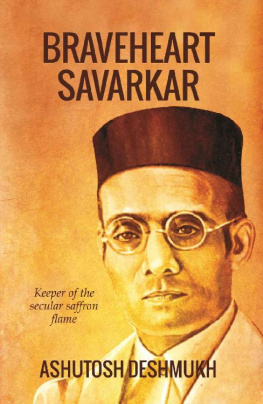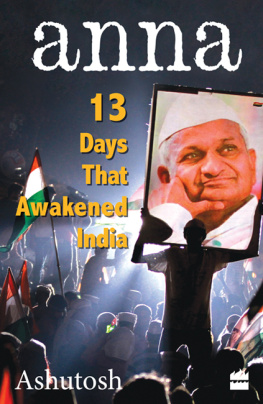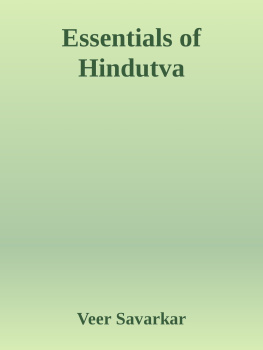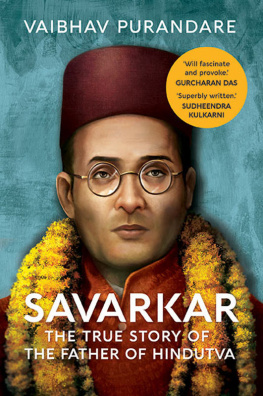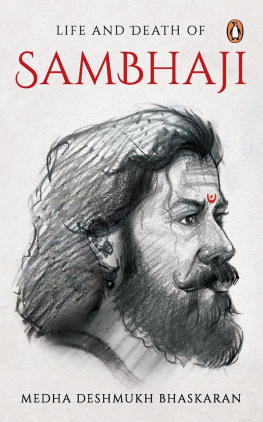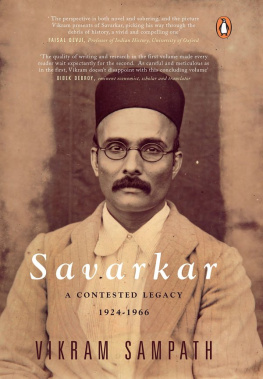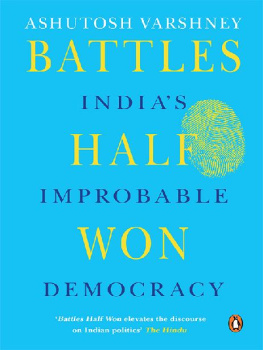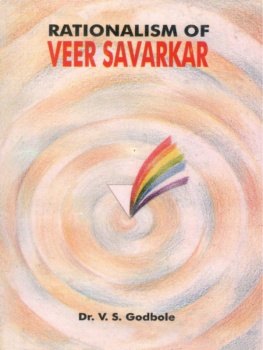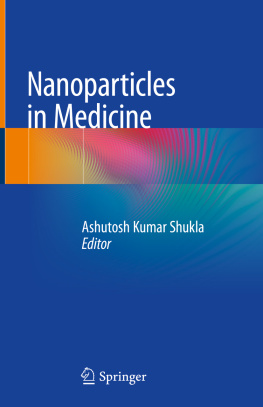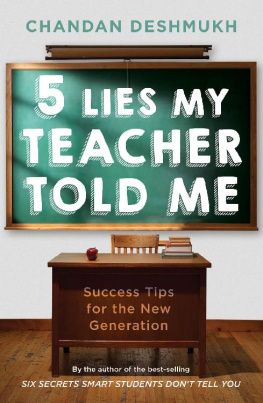Ashutosh Deshmukh - Braveheart Savarkar: Keeper of the Secular Saffron Flame
Here you can read online Ashutosh Deshmukh - Braveheart Savarkar: Keeper of the Secular Saffron Flame full text of the book (entire story) in english for free. Download pdf and epub, get meaning, cover and reviews about this ebook. year: 2019, publisher: The Write Place, genre: Politics. Description of the work, (preface) as well as reviews are available. Best literature library LitArk.com created for fans of good reading and offers a wide selection of genres:
Romance novel
Science fiction
Adventure
Detective
Science
History
Home and family
Prose
Art
Politics
Computer
Non-fiction
Religion
Business
Children
Humor
Choose a favorite category and find really read worthwhile books. Enjoy immersion in the world of imagination, feel the emotions of the characters or learn something new for yourself, make an fascinating discovery.
- Book:Braveheart Savarkar: Keeper of the Secular Saffron Flame
- Author:
- Publisher:The Write Place
- Genre:
- Year:2019
- Rating:3 / 5
- Favourites:Add to favourites
- Your mark:
- 60
- 1
- 2
- 3
- 4
- 5
Braveheart Savarkar: Keeper of the Secular Saffron Flame: summary, description and annotation
We offer to read an annotation, description, summary or preface (depends on what the author of the book "Braveheart Savarkar: Keeper of the Secular Saffron Flame" wrote himself). If you haven't found the necessary information about the book — write in the comments, we will try to find it.
Braveheart Savarkar: Keeper of the Secular Saffron Flame — read online for free the complete book (whole text) full work
Below is the text of the book, divided by pages. System saving the place of the last page read, allows you to conveniently read the book "Braveheart Savarkar: Keeper of the Secular Saffron Flame" online for free, without having to search again every time where you left off. Put a bookmark, and you can go to the page where you finished reading at any time.
Font size:
Interval:
Bookmark:

Dedicated to intellectual inquiry
and the pursuit of truth
As we seek bliss and blessings
For all the human races and realms
Pray tell,
What should we cede to nature?
What should we offer to the holy fire?
Maze Mritupatra (My Final Testament), stanza 12, lines 3 and 4, 1910
S avarkar issues an inspiring challenge for all of us.
In 1910, Savarkar was arrested in London, and he faced the gallows or jail in the Andamans. Savarkars elder brother, Babarao, was already in the Andamans enduring life imprisonment. Savarkar wrote a poem, My Final Testament, addressed to Yesu Vahini, his sister-in-law and de facto mother, explaining the meaning of his actions. A poem so poignant and moving that it still brings tears to the eyes. Savarkars entire life was an offering to Indian independence and Hindu unity. This book chronicles his life, articulates his philosophies, and partially recounts some of his poems. I only capture a dim picture of a life that was a blazing nova, but even that leaves us shaken and scarred.
A while ago, I received a call from my sister, Medha Deshmukh-Bhaskaran, asking me if I was interested in writing a book on Savarkar. She is already an established author and was contacted by Anup Jerajani of the Crossword Bookstores. She knew I have been an avid reader of Savarkar for a long time, and graciously passed on the opportunity. I hesitated. This was an audacious undertaking. The teaching, research, and administrative demands of my Penn State job kept me very busy. Hema and Ameya, my wife and son, pushed me hard. I accepted.
My first memory of reading Savarkar goes way back. I was about 10 years old and struggling with the book Saha Soneri Pane (Six Golden Pages) by Savarkar. I remember harassing my mother, Leela Deshmukh, and asking her incessant questions. She was (is) my Marathi dictionary. Her answers help me even now as I revisit the literature. During my teen years, I read most of Savarkars works and continued to visit him on and off all my life. In retrospect, I am amazed at his influence on my thinking. Such is life!
Savarkar describes three ways of writing history. First, history as a series of facts, dry and lifeless. Second, factual history but written with passion and skill. The facts are presented in a context, infused with meaning, and explained within the overarching, integrative themes. Third, the history is distorted, facts are misrepresented, and confirmatory evidence is sought to support the predetermined conclusions. I have followed the second method to the best of my ability and hope that the readers will like it.
Thus began the saga of writing the book. Where Savarkars original works were written in Marathi, I have done my own translations. Savarkars poems, mostly in Marathi, are multilayered, multi-textured, and heavily metaphorical, the words are dense and difficult. I sought to capture the essence of the poems and not get bogged down in the literal translations. Look at it as one of the many possible translations. The actual writing task also proved far harder and more time consuming than expected. I had to relearn history, revise my understanding, process new insights, and write an interesting and coherent story. I also had to deal with Savarkars worldview, which remains opaque to many people. Finally, the criticism has to be dealt with.
This book is a partial payment of the intellectual debt I owe to Savarkar.
The book is structured as follows:
Prologue provides a synopsis of Savarkars work in various areas, meant as a brief introduction for those who know or remember very little of Savarkar. I also provide a brief introduction to Savarkars world-view and his thinking process. Understanding Savarkar even at the surface level should immensely help in reading his life story.
Parts I VI portray a sketch of Savarkars life. His life is so thrilling and adventurous, the story writes itself.
Part VII provides details of Savarkars views on rationality, Hindutva, the Hindu religion, violence, and minorities. If you are interested in knowing Savarkars actions, you need to understand his philosophical motivations. Keep in mind, this is a brief introduction.
I also wrote two appendices. The subject matter is difficult and has adult themes. You have been warned. The first appendix deals with criticisms of Hindutva, Savarkars alleged mercy petitions from the Andamans, and his role in the Gandhi assassination. I plan to show the other side of the coin, which is rarely articulated. The second appendix deals with the scholarly literature. I evaluate the scholarly literature approximately from 19982018. The scholarly literature paints a very dark and debased picture of Savarkar. I take issues with many conclusions that are not justified by the evidence, while accepting valid criticisms. Frankly, I am appalled at the quality of the scholarship or lack thereof.
Readers, your judgment is final!
I wish to thank Anup Jerajani from Crossword for his encouragement and help. Medha, my sister, who cheered me through the process, deserves a special mention. Hema, my wife, was my sounding board for the ideas and especially for the translations of poems. She read my drafts repeatedly and patiently. She is the wind beneath my wings.
I express my sincere gratitude to the researchers who have done great work in analyzing Savarkars life and philosophy. I would first like to thank Sheshrao More, who spent his life doing painstaking research on Savarkar. Mores three books (2013, 2015, and 2018) have been invaluable in understanding Savarkars philosophy, Savarkars work in Ratnagiri, and the issues surrounding the Gandhi assassination. I have also immensely benefitted from Srivastavs books (1983, 2018) in writing about Savarkars work in London. I also thank Keer (2017) for his authoritative biography on Savarkar, a standard by which all other works will be judged. Dr. Ambedkars books (1941, 1989, and 2013) were very helpful in understanding politics in pre-partition India. My father-in-law, Prabhakar Inamdar, had met Savarkar several times and I included a few of his personal experiences in the book. I also thank Ranjit Savarkar, Manjiri Marathe, and Pradeep Rawat for verifying facts and offering helpful suggestions. Also, a big thanks to all those who maintain the Savarkar Smarak website, a fantastic collection of Savarkars books. Finally, a very special thanks to Kavita Bhalla for superb editing and meticulous attention to details of grammar and style.
A book of this magnitude is bound to have errors. All errors are solely my responsibility.
We knowingly vowed, walking to the pyre
To embrace the searing divine fire
Laws of nature concur
The paths of history do know and remember
Dancing on the embers, charred to cinders
We burned to atone for the sins that shackle our mother
Maze Mritupatra (My Final Testament), repeating stanza 9 and 25, 1910
S avarkar evokes a mix of powerful emotions across the political spectrum. His followers and fans adore and worship him. His critics and detractors despise and denigrate him. Savarkars concept of Hindutva energizes todays political debate. His message of Hindu unity still resonates across the country. His sacrifices and torture in the Andamans elicit tears and respect. His counsel of violence, revenge, and retaliation against enemies stands in stark contrast to the pacifist traditions of the nation. His focus on logic, reason, scientific temper, and agnostic outlook is quietly ignored and buried by his devotees and doubters alike. His bold statement that the cow is merely a useful animal would not be popular even today. The critics attack him as anti-minority, divisive, and guilty in the Gandhi assassination. The criticism speedily becomes ad hominem and a grim, dark, and shocking picture of Savarkar emerges from the collective scholarly literature.
Font size:
Interval:
Bookmark:
Similar books «Braveheart Savarkar: Keeper of the Secular Saffron Flame»
Look at similar books to Braveheart Savarkar: Keeper of the Secular Saffron Flame. We have selected literature similar in name and meaning in the hope of providing readers with more options to find new, interesting, not yet read works.
Discussion, reviews of the book Braveheart Savarkar: Keeper of the Secular Saffron Flame and just readers' own opinions. Leave your comments, write what you think about the work, its meaning or the main characters. Specify what exactly you liked and what you didn't like, and why you think so.

